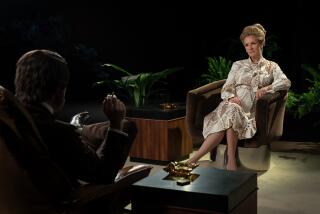Television review: ‘Moby Dick’
The literary leviathan known as “Moby-Dick” swims once again into the dangerous waters of dramatic adaptation Monday night. The last sighting, some 13 years ago, found Patrick Stewart donning the peg leg to play crazy Capt. Ahab for the USA Network; this time William Hurt steers the Pequod in search of the white whale, under the flag of the premium movie-rerun channel Encore, which is edging into original programming.
Both miniseries were produced by companies run by producers Robert Halmi and/or son Robert Halmi Jr., who have never met a work of classic literature they didn’t want to adapt for television. It’s not clear why they’ve deemed this return trip necessary; possibly it was just to see how a dozen years would improve the special effects, or a burning desire to see how Hurt would play the part.
On the first count, we have come some way. On the second, the actor strikes some novel notes — not those intended by Herman Melville, necessarily, but a legitimate reading of the text he’s been given. Directed by Mike Barker from a screenplay by Nigel Williams — the two previously collaborated on a 2008 adaptation of Jack London’s “The Sea Wolf,” also for the Halmis — the film aims for a dry authenticity that only fractionally reflects the big, wild volume on which it’s based, cutting away nearly all of its poetry and most of its madness. There’ll be no “To the last I grapple with thee; from hell’s heart I stab at thee; for hate’s sake I spit my last breath at thee” in this “Moby Dick.”
Any attempt to film “Moby-Dick” faces unusual challenges: How to translate a text that runs in style from naturalistic narrative to encyclopedia entry to theatrical declamation? What to do with characters who, some of them, are less dramatic actors than representations of philosophical attitudes or states of nature?
The script swaps Melville’s Shakespearean flights for plain American talk, occasionally cutting in scraps of the original, but more often relying on Williams’ own inventions. These tend toward CliffsNotes statements of purpose or theme: “Our freedom lies in the struggle to escape what fate’s laid down, to make our future for ourselves.” There are unavoidable elisions and economies in the telling, but there are additions, as well, not all of them worth the while.
Stubb (Eddie Marsan), a jolly fatalist on the page, is here made rather dour; the freshwater sailor Steelkilt is imported from a narrative digression and turned into a pugnacious racist in order to make an unmissable point and to give Stubb someone to rub against. Ishmael (Charlie Cox), who famously narrates the book and is mostly an observer of events once at sea, is made, unconvincingly, a favorite of Ahab’s — they are forever hanging out, talking about things, collaborators and confederates.
Ahab is introduced early here in wholly new scenes with the wife (Gillian Anderson) and child whom Melville only briefly mentions. This seems meant to humanize and soften him and give him something to lose besides his other leg (arms, head, etc.); it also means that we get to hear his little boy ask, “Are you scared … of Moby Dick?” This Ahab is less hubristic monomaniac than he is existential hero: “Anything is permitted on this ship,” Williams has him say, echoing Sartre on Dostoevsky (that thing about how without God everything is permitted). Hurt gives him some humor to contrast with Ethan Hawke’s moody, broody Starbuck, the voice of Christian reason; but the actors connect as glancingly as do their characters.
The set pieces are well realized: The whaling town where Ishmael and cannibal harpooner Queequeg (Raoul Trujillo) meet — Shelburne, Nova Scotia, fills in for New Bedford/Nantucket, Mass. — has a nice bustling energy and persuasive detail. The whaling scenes, when they finally occur, are quite exciting and dynamic, and Moby Dick himself is one big mammal.
But in the end, this is another story of the one that got away.
‘Moby Dick’
Where: Encore
When: 8 p.m. Monday and Tuesday
Rating: TV-14 (may be unsuitable for children under the age of 14)
More to Read
The biggest entertainment stories
Get our big stories about Hollywood, film, television, music, arts, culture and more right in your inbox as soon as they publish.
You may occasionally receive promotional content from the Los Angeles Times.









